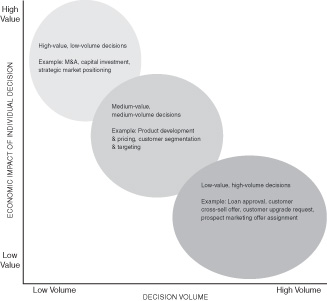In previous articles we introduced Business Decision Management and answered some of the most frequently asked questions about it. Business Decision Management involves the automation and improvement of operational business decisions. This leads us to the topic of this article – what is different about operational decisions and other kinds of decisions?
First, let’s consider the kinds of decisions that organizations must make to succeed. The figure shows a typical view of this: There are some high-value, low volume decisions like strategic positioning or major merger decisions; there are many more medium-value, medium-volume decisions that happen at a more tactical level like product development or broad customer segmentation decisions; and there are the decisions that go on every day in every transaction – of low value individually but being made in very large numbers.

The value and volume of different kinds of decisions.
It is these decisions that are what we mean by operational decisions. These are not one-off decisions, not unstructured decisions but high-volume, repeatable, explicit decisions. Some of these decisions are obvious and easy to find and define, others much less so. These operational decisions can be part of processing a transaction or handling an interaction. They might also be part of several different transactions or interactions. These decisions might be about personalizing a transaction or an interaction where it was previously the same for everyone and they might be decisions that no-one has ever considered before.
One of the most valuable sources of operational decisions is existing manual decisions. Decisions referred to supervisors by staff are often operational decisions, as are those moments in a transaction or conversation where staff must consult policy manuals, regulations or look up tables. Another source of operational decisions are transactions or interactions with contradictory results – the website gives one answer while the call center gives another or where different call center representatives give different answers. Underlying this inconsistency is an operational decision that has not been identified and managed across channels, staff or transactions. Operational decisions can also be missed because they have been subsumed into a larger decision. For instance, a direct mail campaign could be considered to have 4 or 5 decisions – what message, what segment of the customer base, what format, what offer and so on. If the direct mail piece went out to 100,000 people, however, you have 100,000 operational decisions. You decided in each of 100,000 cases to send this particular letter to this particular person. That decision – what to send to this specific person – is an operational decision. Finally there are operational decisions that never get taken. These decisions, like what options to display or how to print a statement, are so deeply hidden in the code to run the system, ATM. Kiosk or websites that no-one even thinks of them as decisions. BDM involves identifying these decisions, making them explicit and then managing and improving them over time.
When considering an operational decision for the application of Business Decision Management, it is worth considering how likely it is to show a strong ROI. Aspects of a decision that make it likely to show a high ROI from BDM include:
- Volume – the number of decisions of a particular type you must make is high. Volume alone can cause problems or exacerbate another decision problem, such as compliance or risk assessment.
- Latency – when you can see trouble coming but can’t change how you make decisions in time, you might have an operational decision problem.
- Variability – if the way something is decided in a process or system is highly dependent on outside factors, like competitors or the market, then it could be a candidate thanks to this potential for variability.
- Compliance – the need to demonstrate compliance of every decision can be a driver.
- Straight-through processing – a manual review that drags down response time in a process might be hiding a problem-prone operational decision.
- Managing risk – a risk-centered decision that must be made quickly or in volume might be a good candidate for an operational decision.
- Unattended – for example, there’s no person who can make a decision in transactions on your Web site or at your ATM.
- Self-service – decision required so that customers can self-serve.
- Personalized – any time you want to personalize interactions, you’re making a decision.
Organizations depend on operational decision making and when operational decisions must be made in challenging circumstances, BDM is the best way to take control of them and make them work for you.In the next article we will discuss the technology you need to deliver BDM.
1 Taylor, J., & Raden, N. (2007). Smart (Enough) Systems: How to Deliver Competitive Advantage by Automating Hidden Decisions. New York: Prentice Hall.

















